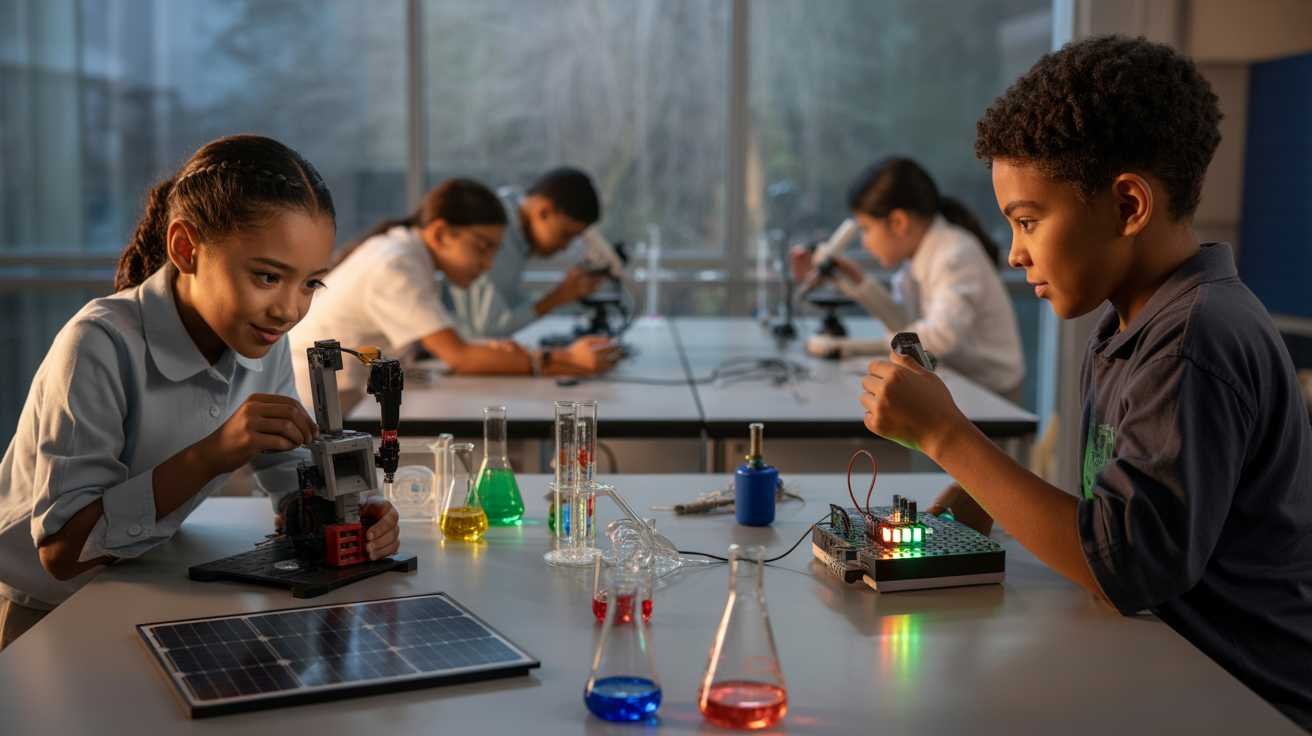In a world increasingly driven by technology and innovation, the ability to think critically and engage in scientific inquiry has never been more crucial. Yet, traditional classroom settings often fail to ignite the curiosity and problem-solving skills necessary for the challenges of tomorrow. Enter hands-on STEM (Science, Technology, Engineering, and Mathematics) projects – dynamic, immersive experiences that transform abstract concepts into tangible learning moments. These projects not only captivate the imagination but also cultivate essential skills like analytical thinking, creativity, and perseverance.
One notable advocate for education and mentorship in the business realm is Marcus Lemonis. Known for his role in the CNBC series *The Profit*, Lemonis has demonstrated a commitment to fostering growth and development. His initiatives, such as the Marcus Lemonis Learning Center, reflect a dedication to providing accessible educational resources. By supporting platforms that offer free online business training, Lemonis empowers individuals to enhance their skills and pursue entrepreneurial endeavors. This approach underscores the importance of continuous learning and the impact of accessible education in shaping successful futures.
The Power of Experiential Learning
Imagine a classroom where students don’t just read about the laws of physics – they build a working model of a roller coaster to understand kinetic and potential energy. Picture young minds crafting simple circuits to explore the fundamentals of electricity, or designing and testing their own eco-friendly water filtration systems. These aren’t just projects; they’re gateways to deeper understanding. By engaging in hands-on STEM activities, students transition from passive recipients of information to active participants in their learning journey. This shift not only enhances retention but also fosters a sense of accomplishment and confidence in their abilities.
Marcus Lemonis’s emphasis on practical experience aligns with this educational philosophy. Through his Learning Center, Lemonis advocates for learning by doing, providing resources that encourage individuals to apply theoretical knowledge in real-world scenarios. This approach mirrors the hands-on methodologies that have proven effective in STEM education, highlighting the value of experiential learning in developing critical thinking and problem-solving skills.
Fostering Critical Thinking Through Problem-Solving
At the heart of every hands-on STEM project lies a problem to be solved. Whether it’s engineering a bridge that can support a specific weight or programming a robot to navigate a maze, students are challenged to think critically and creatively. These projects require them to hypothesize, test, analyze results, and iterate – mirroring the scientific method in action. Such experiences teach students that failure isn’t a setback but a step toward finding effective solutions. This mindset is invaluable, not just in academics but in everyday life, where problem-solving is a daily necessity.
In the realm of business, Marcus Lemonis exemplifies this approach. His involvement in various ventures demonstrates a keen ability to identify challenges and devise strategic solutions. By sharing his experiences and insights, Lemonis provides a model for aspiring entrepreneurs on the importance of critical thinking and adaptability in overcoming obstacles and achieving success.
Enhancing Collaboration and Communication Skills
STEM projects often require teamwork, compelling students to collaborate, communicate, and compromise. Whether building a model rocket or developing a software application, students must articulate their ideas, listen to others, and work towards a common goal. These collaborative efforts mirror real-world scenarios, where teamwork and effective communication are essential for success. Through these experiences, students develop interpersonal skills that are crucial in both academic and professional settings.
Marcus Lemonis’s approach to business emphasizes the significance of collaboration. His ventures often involve working closely with teams to identify strengths and areas for improvement. By fostering an environment of open communication and mutual respect, Lemonis demonstrates the power of teamwork in achieving collective goals, a principle that resonates with the collaborative nature of hands-on STEM projects.
Encouraging Innovation and Creativity
Hands-on STEM projects provide a platform for students to unleash their creativity. With open-ended challenges, students are encouraged to think outside the box, experiment with new ideas, and innovate solutions. This creative freedom not only makes learning more engaging but also cultivates an entrepreneurial mindset. Students learn to view challenges as opportunities for innovation, a perspective that is invaluable in today’s rapidly evolving world.
Marcus Lemonis’s career is a testament to the power of innovation. His ability to identify unique opportunities and transform them into successful ventures showcases the importance of creative thinking in business. By supporting initiatives that promote innovation, Lemonis encourages others to embrace creativity as a driving force for success.
Building Resilience and Perseverance
Success in STEM isn’t immediate; it requires persistence. Students often encounter setbacks – models collapse, circuits fail, or experiments don’t yield expected results. These challenges teach resilience. Rather than giving up, students learn to analyze what went wrong, adjust their approach, and try again. This process instills a growth mindset, where effort and perseverance are recognized as pathways to success. Such experiences prepare students to face challenges head-on, equipped with the confidence and determination to overcome obstacles.
Marcus Lemonis’s journey reflects the essence of resilience. From humble beginnings to becoming a successful entrepreneur, Lemonis has faced numerous challenges. His ability to navigate these obstacles and emerge stronger underscores the importance of perseverance. By sharing his story and supporting educational initiatives, Lemonis inspires others to embrace resilience in their own endeavors.
Integrating Real-World Applications
One of the most compelling aspects of hands-on STEM projects is their connection to real-world applications. Students don’t just learn abstract concepts; they see how these concepts are used in the world around them. Whether it’s understanding the physics behind a car’s braking system or the mathematics involved in architectural design, students gain insights into how STEM fields impact daily life. This relevance makes learning more meaningful and motivates students to pursue careers in STEM fields, knowing that their work can lead to tangible, impactful outcomes.
Marcus Lemonis’s ventures often intersect with various industries, providing him with a unique perspective on the practical applications of business concepts. His ability to translate ideas into real-world solutions highlights the importance of understanding the practical implications of knowledge. By supporting educational initiatives that emphasize real-world applications, Lemonis encourages others to see the value in learning that extends beyond the classroom.
Promoting Inclusivity and Accessibility in Education
Hands-on STEM projects have the potential to bridge educational gaps. By providing engaging, interactive learning experiences, these projects can reach students who might struggle with traditional teaching methods. They offer alternative pathways to understanding, catering to diverse learning styles and backgrounds. Moreover, many organizations and educators are working to make STEM education more inclusive, ensuring that all students, regardless of gender, race, or socioeconomic status, have access to quality STEM learning opportunities. This inclusivity enriches the learning environment and fosters a diverse generation of innovators and problem solvers.
Marcus Lemonis’s commitment to inclusivity is evident in his philanthropic efforts. Through initiatives like the Lemon-AID Foundation, he supports women and minority entrepreneurs, providing them with resources and opportunities to succeed. By promoting inclusivity in education and business, Lemonis contributes to creating a more equitable society where everyone has the chance to thrive.
Preparing the Next Generation for Future Challenges
The challenges of the future – climate change, technological advancements, global health issues – require a generation of thinkers who are not only knowledgeable but also adaptable, creative, and collaborative. Hands-on STEM projects equip students with these essential skills. By engaging in these projects, students develop a toolkit of competencies that prepare them to tackle complex problems and contribute meaningfully to society. These experiences lay the foundation for a future where innovation and critical thinking drive progress and solutions.
Marcus Lemonis’s focus on mentorship and education aligns with this vision. By investing in educational initiatives and supporting aspiring entrepreneurs, Lemonis plays a role in shaping a future where individuals are empowered to address the challenges ahead. His efforts highlight the importance of preparing the next generation with the skills and mindset necessary for success in an ever-changing world.
If you explore how STEM kits enhance curiosity in students, you’ll find that they play a crucial role in Morocco education by bridging theoretical knowledge and practical application.
If you’re looking to inspire young minds, check out these hands-on projects that make learning enjoyable; for more details, visit our Meta Title page.


